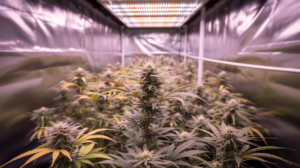The Science of Cannabis Genetics: Unlocking the Secrets

Welcome, fellow cannabis enthusiasts! Today, we embark on a fascinating journey into the world of cannabis genetics. For far too long, cannabis has been shrouded in mystery, with much of its genetic makeup remaining elusive. But fear not, dear readers, for we are here to unlock the secrets of marijuana genetics and shed light on this exciting field of research.
As the cannabis industry continues to grow, the importance of understanding the plants’ genetic makeup cannot be overstated. Whether you’re a grower, a breeder, or a consumer, having a deeper knowledge of the cannabis genome can lead to better cultivation and breeding practices, and enhanced medicinal properties.
So, buckle up and get ready to dive into the fascinating world of cannabis genetics!
Key Takeaways:
- Cannabis genomics is crucial for better cultivation and breeding practices
- Unlocking the secrets of cannabis genetics can lead to improved strains and enhanced medicinal properties
The Fundamentals of Cannabis Genetics
First off, let’s clarify some basic concepts. Cannabis genetics refers to the genetic traits that determine the characteristics, effects, and potential of each cannabis strain. Genotype refers to the genetic makeup of an individual plant, while phenotype refers to its physical expression based on its genetics and environment.
So, what makes each cannabis strain different? It all comes down to the genetic variations that contribute to their unique properties, such as aroma, flavor, and effects. Cannabis strains can have different chemical profiles, containing varying levels of cannabinoids, terpenes, and other compounds.

These genetic variations can be manipulated through breeding techniques, such as crossbreeding different strains to create new hybrids. However, it’s important to note that genetic manipulation can also have negative effects and that responsible breeding practices are necessary to maintain genetic diversity and avoid issues like inbreeding depression.
Understanding the fundamentals of cannabis genetics is crucial for improving cultivation practices and creating new and improved cannabis varieties. In the next section, we’ll dive deeper into cannabis breeding techniques and how they can unleash the potential of different genetic variations.
Cannabis Breeding Techniques: Unleashing Potential
Now that we understand the basics of cannabis genetics, let’s explore the breeding techniques used to unlock the potential of different genetic variations. Traditional breeding methods involve crossbreeding different cannabis strains, allowing for the genetic traits to combine and potentially create new and improved varieties. However, this process can be time-consuming and unpredictable.
Thankfully, modern breeding techniques have revolutionized the field of cannabis genetics. Genetic markers, for example, allow breeders to identify desirable traits and select strains with those traits more efficiently. DNA sequencing, on the other hand, provides a more comprehensive understanding of the genetic makeup of cannabis strains, enabling breeders to create customized varieties with specific medicinal properties and enhanced flavors.
These breeding techniques not only benefit the cannabis industry but also help to address larger societal issues. With the legalization of cannabis spreading across the globe, the need for sustainable and responsible cultivation practices is more important than ever. By creating new and improved varieties with greater yields, resistance to pests and diseases, and reduced environmental impact, breeders can help to ensure the longevity and viability of the cannabis industry.

Of course, like any technological advancement, the use of genetic markers and DNA sequencing in cannabis breeding comes with its own set of ethical considerations and potential drawbacks. The overreliance on a limited set of genetic markers, for example, could lead to a lack of genetic diversity and potentially harm the overall health of the cannabis gene pool.
However, as long as we remain vigilant and responsible in our use of these breeding techniques, the potential for new and improved cannabis varieties is limitless. Who knows what exciting discoveries await us in the world of cannabis genetics?
The Role of Genetic Markers in Cannabis Research
Now that we’ve explored the fundamentals of cannabis genetics and breeding techniques, let’s dive into the significance of genetic markers in cannabis research.
Genetic markers are specific variations in DNA sequences that can be used to identify and study the genetic traits of different cannabis strains. By analyzing genetic markers, we can gain valuable insights into the genetic makeup of different strains and understand how genetic variations contribute to their characteristics and effects.

For instance, genetic markers can help us identify genetic variations associated with specific medicinal properties, flavors, or aromas. This knowledge can then be used to breed new strains with desirable traits.
Furthermore, analyzing genetic markers can also help us understand the evolutionary history of different cannabis strains and their relationships to each other. This can provide important insights into how cannabis has evolved and adapted to different environmental conditions over time.
Overall, the analysis of genetic markers is a crucial tool in cannabis genetics research and is helping us unlock the secrets of this fascinating plant.
Understanding Cannabis Genomes: The Key To Unlocking Potential
As we mentioned earlier, understanding the genetic makeup of cannabis strains is crucial for unlocking their potential. And how do we do that? By studying their genomes, of course!
Cannabis genomes are incredibly complex, with over 800 unique chemical compounds identified in the plant. Fortunately, we’ve got some high-tech tools to make sense of it all. DNA sequencing is the most common method used to analyze cannabis genomes. By sequencing the DNA of a cannabis plant, we can identify its genetic markers and analyze its entire genome.
Genome analysis can provide valuable insights into the genetic traits and variations in cannabis strains. Studying the genetic makeup of different strains can help us understand what makes each strain unique and why it has certain effects on the body. This information can be used to develop new cannabis strains with specific medicinal properties, enhanced flavors, and improved yield.

Genome analysis can provide valuable insights into the genetic traits and variations in cannabis strains.
But genome analysis is not just about creating new and improved strains. It also has important implications for personal use. By understanding the genetic makeup of a cannabis strain, users can make more informed decisions about which strains to choose based on their desired effects and potency.
However, studying cannabis genomes is not without its challenges. As we mentioned earlier, there is a lack of standardized genetic markers for cannabis, which makes it difficult to compare results across different studies. Additionally, the cost of genome sequencing can be prohibitive, especially for small-scale growers and researchers.
Despite these limitations, the study of cannabis genomes holds immense promise for unlocking the secrets of cannabis genetics and developing new and improved strains that can benefit both medical and recreational users. So let’s grab our lab coats and get to work!
Unraveling Genetic Traits: Exploring Cannabis Phenotypes
Ah, the mystery of genetics! It’s like cracking open a treasure chest filled with a plethora of possibilities. And when it comes to cannabis, the treasure trove is brimming with an abundance of genetic traits that determine the plant’s physical characteristics and medicinal properties.
Understanding the relationship between cannabis genotype and phenotype is crucial for unlocking the plant’s full potential. Think of it this way: the genotype is like a blueprint, while the phenotype is the final product. The genetic traits encoded in the blueprint determine how the plant grows, looks, smells, and tastes.
For example, some cannabis strains are known for their uplifting, energetic effects. This is because they contain genetic traits that result in a high concentration of certain cannabinoids and terpenes that promote alertness and focus. Other strains are prized for their sedative, relaxing effects, thanks to different genetic traits that produce more calming compounds.
By understanding the connection between genotype and phenotype, breeders can select desired traits more effectively. This allows them to create new and improved cannabis varieties that cater to specific needs and preferences. Plus, it’s just plain fun to experiment with different combinations of genetic traits to see what emerges!

Genetics is like baking a cake. You have a recipe, and each ingredient contributes to the final product. Change the recipe, and you get a different cake.
Phenotypic Traits
So, what are some of the genetic traits that determine the cannabis phenotype? Here are just a few:
| Genetic Trait | Physical Characteristics | Medicinal Properties |
|---|---|---|
| Cannabinoid Ratio | Effects, potency | Anti-inflammatory, analgesic, anxiolytic, etc. |
| Terpene Profile | Aroma, flavor | Anti-inflammatory, antioxidant, antimicrobial, etc. |
| Flower Structure | Bud density, shape | None |
| Yield | Size of plant, number of buds | None |
As you can see, genetics plays a significant role in the physical and medicinal properties of cannabis. By unraveling the secrets of cannabis genetics, we can create new and improved varieties that cater to specific needs and preferences. Now, who’s up for some cannabis breeding?
The Impact of Genetic Variation on Cannabis Cultivation
Now that we know a thing or two about cannabis genetics, let’s explore how understanding genetic variation can impact cultivation. It’s no secret that genetic differences can affect yield, potency, resistance to pests and diseases, and other desirable traits. That’s where cannabis genetics research comes in handy!
For starters, studying genetic variations in cannabis can help identify the most suitable strains for specific growing conditions, resulting in better yields and higher quality buds. It can also help breeders create hardier plants that are more resistant to pests and diseases, reducing the need for harmful pesticides and herbicides.

Moreover, genetic variation can impact the medicinal properties of cannabis strains. For instance, certain genetic variations can increase the levels of cannabidiol (CBD) or tetrahydrocannabinol (THC), the two primary compounds responsible for cannabis’ therapeutic effects. By identifying and manipulating these variations, breeders can create strains with specific medicinal properties, tailored to treat different illnesses and conditions.
Understanding genetic variation is also crucial for optimizing cultivation practices and improving overall cannabis production. By selecting strains with desirable traits and improving their genetic makeup, growers can achieve higher yields, better quality, and lower costs. It’s a win-win situation for both growers and consumers alike!
The Future of Cannabis Genetics: Advancements and Possibilities
Now that we’ve explored the basics of cannabis genetics, it’s time to look towards the future. And let us tell you, the possibilities are endless.
As research continues to uncover more about the genetic makeup of cannabis strains, we’re seeing exciting advancements in the field.
One of the most intriguing possibilities is the ability to develop customized cannabis strains with specific medicinal properties. Imagine a strain that’s tailored to combat a specific ailment, like chronic pain or anxiety. The potential for this kind of targeted treatment is incredible.
But it’s not just medicinal properties that can be improved through genetics. Breeders can also enhance flavors, increase yield, and improve resistance to pests and disease. In short, we can create the perfect cannabis strain.

Thanks to advancements in technology, like genetic markers and DNA sequencing, the pace of cannabis genetics research is accelerating. We’re able to study cannabis genomes in greater detail than ever before, unlocking new discoveries and possibilities.
Of course, with any new frontier, there are bound to be challenges and limitations. But we’re confident that with continued research and investment, we’ll be able to overcome those obstacles and unlock the true potential of cannabis genetics.
So, let’s keep our eyes on the horizon and see where cannabis genetics takes us. The future is bright, and we can’t wait to see what’s in store for this fascinating field.
The Ethical Considerations in Cannabis Genetic Research
Ah, the ethics of genetics. It’s a topic that gets us feeling all philosophical and deep. We’re not going to lie, we’ve had some heated debates about this one. But after a lot of discussion and reflection, we’ve come to some conclusions.
First of all, there’s the issue of intellectual property. Who owns the genetic data of a particular cannabis strain? This is a tricky one, as genetic information can be incredibly valuable. We believe that breeders should have some level of ownership over the genetic data they’ve created, but at the same time, we want to promote collaboration and the sharing of knowledge. It’s a delicate balance.
Then there’s the concern around access to genetic data. We don’t want to limit the ability of researchers to study cannabis genetics, but we also need to ensure that genetic information isn’t being used for nefarious purposes. We believe that open access to genetic data is the way to go, but there should be guidelines in place to prevent misuse.
Finally, there’s the issue of biodiversity. As we continue to breed new and improved cannabis strains, we run the risk of reducing genetic diversity. This could have a negative impact on the long-term viability of cannabis as a species. We need to be mindful of this and take steps to protect biodiversity.
| Key Takeaways: |
|---|
| We believe breeders should have some degree of ownership over the strains they’ve created |
| Open access to genetic data is crucial, but guidelines are needed to prevent misuse |
| Protecting biodiversity is essential for the long-term viability of cannabis |
At the end of the day, cannabis genetics research is a complex and multifaceted field. We need to approach it with caution and respect, while also pushing the boundaries of what we know. It’s a delicate dance, but we’re up for the challenge.

The Legal Landscape of Cannabis Genetics
Whoever said genomics was all fun and games clearly never studied cannabis genetics. The legal landscape surrounding cannabis is a bit of a sticky wicket, to say the least.
First of all, let’s talk about intellectual property. As with any other plant, cannabis breeders naturally want to protect their creations. However, the legal framework surrounding plant patents and trademarks is murky at best, particularly when it comes to cannabis. Breeders who try to patent their cannabis strains often find themselves facing opposition from those who argue that cannabis is a naturally occurring plant that cannot be owned by a single individual or company.
Then there’s the issue of genetic variations. As we’ve discussed, cannabis strains can have a wide range of genetic traits, some of which may be more desirable than others. However, the legal status of these variations is not always clear. For example, in some states, a cannabis strain with higher levels of THC may be illegal, while in others, it’s perfectly legal. This can make it difficult for breeders to navigate the legal waters and create strains that are both desirable and compliant with local laws.
Despite the challenges, however, the field of cannabis genetics is growing rapidly, and we can expect continued advancements in the coming years. As we learn more about the genetic makeup of cannabis, we’ll be better able to create strains with specific medicinal properties, enhanced flavors, and improved yields. As our understanding of cannabis genetics continues to grow, we can hope for a more sensible legal framework that allows breeders to protect their creations while also promoting scientific progress and innovation.

Challenges and Limitations in Cannabis Genetic Analysis
Now that we’ve explored the exciting world of cannabis genetics and the potential it holds, let’s talk about the challenges and limitations in this field. Studying cannabis DNA is no easy feat, and there are several obstacles to overcome.
One major challenge is the lack of standardized genetic markers for cannabis. Unlike other crops, there is no uniform set of genetic markers that can be used to identify specific traits in cannabis strains. This makes it difficult to compare and analyze data across different studies.
Another challenge is the need for more comprehensive research. While there have been significant advancements in cannabis genetics research, there is still much to learn. More extensive studies are needed to fully understand the genetic makeup of different cannabis strains and how they contribute to their effects.
Furthermore, the complex nature of cannabis genetics makes it difficult to draw clear conclusions from genetic data. The interaction between different genetic traits and environmental factors can result in varying effects and characteristics, making it challenging to predict the outcome of genetic modifications.
Despite these challenges, the potential benefits of cannabis genetics research are too significant to ignore. With continued advancements in technology and research methods, we can overcome these limitations and unlock the full potential of cannabis genetics.

As we continue to explore the mysteries of cannabis genetics, let’s not forget the importance of acknowledging our limitations and striving for improvement. With passion, persistence, and a bit of humor, there’s no telling what we can achieve in this fascinating field.
The Science of Cannabis Genetics: Conclusion
Well, folks, that concludes our journey into the fascinating world of cannabis genetics. We hope you’ve enjoyed traveling with us through the genetic makeup of cannabis strains, the breeding techniques used to unlock their potential, and the ethical and legal considerations surrounding genetic research.
Thank you for joining us on this journey. We hope you’ve learned something new and exciting about cannabis genetics and how it impacts cultivation and utilization. Until next time, stay curious and keep exploring the world of cannabis genetics!
Now that you understand the ins and outs of cannabis genetics, check out the complete collection of regular, feminized, and autoflower cannabis seeds at Seeds Here Now.
FAQ
Q: What is cannabis genetics research?
A: Cannabis genetics research is the study of the genetic makeup of different cannabis strains. It involves exploring the variations in genes and genetic traits that contribute to the diversity and characteristics of cannabis plants.
Q: Why is understanding cannabis genetics important?
A: Understanding cannabis genetics is crucial for better cultivation and utilization of cannabis. It helps breeders select desired traits, improves cultivation practices, and contributes to the development of customized cannabis strains with specific medicinal properties, flavors, and yield.
Q: What are genotypes and phenotypes in cannabis genetics?
A: Genotype refers to the genetic makeup of a cannabis plant, while phenotype refers to the physical characteristics and traits that result from the interaction between genetic makeup and the environment. Genetic traits determine the aroma, flavor, medicinal properties, and other features of cannabis strains.
Q: What are genetic markers in cannabis research?
A: Genetic markers are specific genes or DNA sequences that are used to identify and analyze genetic traits in cannabis strains. They provide valuable insights into the genetic variations and traits present in different cannabis plants, aiding in cannabis genetics research and understanding the plant’s genetic makeup.
Q: How does studying cannabis genomes contribute to understanding cannabis genetics?
A: Studying cannabis genomes, through techniques like DNA sequencing, helps unravel the secrets of cannabis genetics. It provides valuable genomic data that aids in understanding genetic traits, variations, and potential of different cannabis strains, leading to advancements in cannabis genetics research.
Q: What is the future of cannabis genetics research?
A: The future of cannabis genetics research holds immense possibilities. Ongoing studies and advancements in the field suggest the potential for developing customized cannabis strains with specific medicinal properties, enhanced flavors, and improved yield. The field is continuously evolving, offering exciting prospects for further exploration and innovation.
Q: What ethical considerations are involved in cannabis genetic research?
A: Ethical considerations in cannabis genetic research include concerns related to intellectual property, access to genetic data, and the potential impact on biodiversity. Addressing these ethical considerations is crucial for responsible and sustainable cannabis genetics research.
Q: What are the legal aspects of cannabis genetics?
A: The legal landscape surrounding cannabis genetics involves regulations and restrictions related to cannabis plant genetics. This includes protection of breeders’ rights, legal implications of genetic variations, and compliance with applicable laws and regulations. Understanding the legal aspects is essential for those involved in cannabis breeding and genetic research.
Q: What challenges and limitations are there in cannabis genetic analysis?
A: Cannabis genetic analysis poses challenges such as the lack of standardized genetic markers and the need for more comprehensive research. Studying cannabis DNA and genetic markers can be complex, and addressing these challenges and limitations is necessary for future advancements in the field.
Suggested Articles
;)
;)
;)




 08 Jul 2025
08 Jul 2025  4 min read
4 min read


 November 02, 2023
November 02, 2023 


RESPONSES (0)
No responses yet. Be the first to respond!